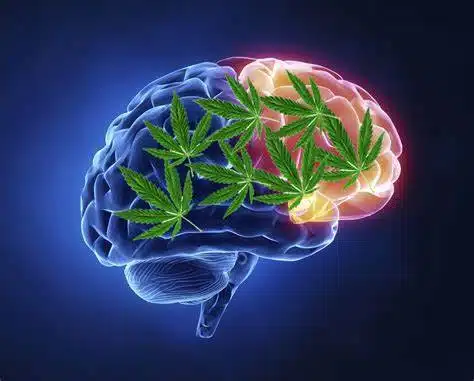How Weed Affects Cognitive Functions

How Weed Affects Cognitive Functions
Welcome to another informative blog post about cannabis! In this article, we will explore the fascinating topic of how weed affects cognitive functions. Cannabis, also known as marijuana, has been a subject of interest for its potential therapeutic benefits and recreational use. However, it is essential to understand the impact it may have on cognitive abilities. So, let’s dive in and explore the relationship between weed and cognitive functions.
1. The Basics of Cannabis and Cognitive Functions
Before we delve into the effects of cannabis on cognitive functions, let’s start with a brief overview of what cannabis is and how it interacts with our brain. Cannabis is a plant that contains various chemical compounds called cannabinoids, including THC (tetrahydrocannabinol) and CBD (cannabidiol). These cannabinoids interact with our body’s endocannabinoid system, which plays a crucial role in regulating various physiological processes, including cognition.
2. Short-Term Effects of Cannabis on Cognitive Functions
When consumed, cannabis can produce short-term effects on cognitive functions. These effects can vary depending on factors such as the strain of cannabis, dosage, and individual differences. Some individuals may experience temporary impairments in memory, attention, and decision-making abilities after using cannabis. However, it’s important to note that these effects are usually temporary and tend to subside as the effects of cannabis wear off.
3. Long-Term Effects of Cannabis on Cognitive Functions
While short-term effects are temporary, there has been ongoing debate about the potential long-term effects of cannabis on cognitive functions, especially when used regularly and in high doses. Some studies suggest that heavy and prolonged cannabis use, particularly during adolescence, may have a negative impact on cognitive abilities such as memory, attention, and executive functions. However, more research is needed to fully understand the long-term effects and potential risks associated with cannabis use.
4. Cannabis and Cognitive Enhancement
Contrary to the potential negative effects, some individuals claim that cannabis can enhance certain cognitive functions. They believe that cannabis can boost creativity, improve focus, and enhance problem-solving abilities. However, it’s important to approach these claims with caution, as the effects of cannabis can vary greatly from person to person. What may work for one individual may not have the same effect on another.
5. Managing Cognitive Effects: Strain Selection and Dosage
If you are considering using cannabis and are concerned about its potential impact on cognitive functions, there are a few factors to consider. First, strain selection plays a crucial role. Different strains of cannabis contain varying levels of cannabinoids, which can result in different effects. For example, strains high in CBD and low in THC may have less pronounced cognitive effects compared to strains high in THC.
6. The Importance of Responsible Use
Responsible use of cannabis is essential to minimize any potential negative impact on cognitive functions. It’s crucial to start with low doses and gradually increase if needed, allowing your body to adjust to the effects. Additionally, avoiding excessive and frequent use can help reduce the risk of developing tolerance and potential cognitive impairments.
7. Seeking Professional Advice
If you have concerns about how cannabis may affect your cognitive functions, it is always advisable to seek professional advice. Consulting with a healthcare provider or a knowledgeable cannabis specialist can provide you with personalized guidance and help you make informed decisions based on your specific needs and circumstances.
Cognitive Functions
Cognition, the mental processes and abilities related to acquiring, processing, storing, and using information, is a fundamental aspect of human existence. It encompasses a wide range of functions, including perception, attention, memory, language, problem-solving, decision-making, and reasoning. These cognitive abilities are not only crucial for our daily functioning but also shape our experiences, interactions, and overall quality of life.
One of the primary reasons cognition is so important to us is its role in problem-solving. Humans are faced with a multitude of challenges and obstacles in their lives, ranging from simple tasks to complex problems. Cognitive functions allow us to analyze these situations, identify patterns, and generate effective solutions. Whether it’s finding the best route to work, troubleshooting a technical issue, or resolving a personal conflict, our cognitive abilities enable us to navigate through these challenges and find optimal solutions.
Furthermore, cognition plays a vital role in learning and memory. The ability to acquire new knowledge, retain information, and recall it when needed is essential for personal growth, education, and professional development. Cognitive functions allow us to process and understand new information, make connections between different concepts, and store it in our long-term memory. This knowledge forms the foundation for our skills, expertise, and intellectual capabilities.
Cognitive functions also contribute significantly to decision-making. Every day, we are faced with numerous choices, ranging from simple preferences to life-altering decisions. Our cognitive abilities help us evaluate options, consider potential outcomes, and make informed choices. By weighing the pros and cons, assessing risks, and considering our values and goals, cognition enables us to make decisions that align with our best interests and values.
Attention, another crucial cognitive function, allows us to selectively focus on relevant information while filtering out distractions. In today’s fast-paced and information-rich world, the ability to concentrate and maintain focus is increasingly important. Attention allows us to engage fully in tasks, absorb information effectively, and perform at our best. It is the foundation for productivity, efficiency, and success in various domains, including work, education, and personal pursuits.
Language, a complex cognitive function, is central to human communication. It enables us to express our thoughts, ideas, and emotions, as well as understand and interpret the messages of others. Language allows us to share information, collaborate, build relationships, and transmit knowledge across generations. It is a powerful tool that facilitates social interaction, cultural exchange, and the development of collective knowledge.
Perception, another critical cognitive function, allows us to interpret and make sense of the world around us. It involves processing sensory information from our environment, such as visual, auditory, tactile, and olfactory inputs. Perception enables us to recognize objects, identify faces, navigate our surroundings, and respond appropriately to stimuli. It forms the basis for our understanding of the physical world and our ability to interact with it effectively.
Emotional regulation, a cognitive function closely intertwined with our emotions, plays a crucial role in our psychological well-being. It involves the ability to recognize, understand, and manage our emotions in various situations. Cognitive functions allow us to regulate our emotional responses, make appropriate decisions based on emotional cues, and maintain emotional balance. Effective emotional regulation contributes to mental health, resilience, and positive interpersonal relationships.
Social cognition, another aspect of cognition, involves the ability to understand and interpret the thoughts, intentions, and emotions of others. It allows us to navigate social interactions, empathize with others, and form meaningful relationships. Social cognition is essential for effective communication, cooperation, and collaboration, enabling us to thrive in social environments.
Creativity, often considered a higher-order cognitive function, involves the generation of novel and valuable ideas, solutions, and expressions. It requires cognitive flexibility, divergent thinking, and the ability to make connections between seemingly unrelated concepts. Creativity is not limited to artistic endeavors but is also crucial in problem-solving, innovation, and adapting to new situations. It allows us to think outside the box, explore new possibilities, and contribute to the advancement of society.
Cognitive functions are essential for both humans and animals as they play a crucial role in various aspects of life. Here are some reasons why cognitive functions are important:
-
Problem-solving and Adaptability: Cognitive functions enable individuals to analyze situations, identify problems, and come up with effective solutions. This ability to problem-solve and adapt to new challenges is vital for survival and success in changing environments.
-
Learning and Memory: Cognitive functions allow us to acquire new knowledge, retain information, and recall it when needed. Learning and memory are fundamental for acquiring skills, retaining important information, and building upon previous experiences.
-
Decision-making: Cognitive functions help in evaluating options, considering consequences, and making informed decisions. The ability to weigh pros and cons, assess risks, and make rational choices is crucial for personal, social, and professional decision-making.
-
Attention and Focus: Cognitive functions enable individuals to selectively attend to relevant information while filtering out distractions. Attention and focus are essential for concentration, productivity, and effective performance in various tasks.
-
Language and Communication: Cognitive functions are closely linked to language processing and communication. They allow individuals to understand and express thoughts, ideas, and emotions, facilitating effective communication and social interaction.
-
Perception and Sensory Processing: Cognitive functions help in interpreting sensory information from the environment, allowing individuals to perceive and make sense of the world around them. This includes processing visual, auditory, tactile, and other sensory inputs.
-
Emotional Regulation: Cognitive functions play a role in regulating emotions and managing emotional responses. They help individuals understand and interpret emotions, regulate emotional reactions, and make appropriate emotional responses in different situations.
-
Social Cognition: Cognitive functions contribute to social cognition, which involves understanding and interpreting social cues, emotions, intentions, and perspectives of others. This ability is crucial for empathy, social interaction, and building and maintaining relationships.
-
Creativity and Innovation: Cognitive functions support creative thinking, imagination, and innovation. They allow individuals to generate new ideas, think outside the box, and come up with novel solutions to problems.
In summary, cognitive functions are important for humans and animals as they enable problem-solving, learning, memory, decision-making, attention, language, perception, emotional regulation, social cognition, and creativity. These functions are vital for survival, adaptation, personal development, social interaction, and overall cognitive well-being.
Weed and Cognitive Effects
The effects of cannabis on cognition are a complex and nuanced topic. While some studies suggest that heavy and prolonged cannabis use, particularly during adolescence, may have negative effects on cognitive functions, it is important to consider various factors such as dosage, frequency of use, individual differences, and the specific cognitive domains being assessed.
Research indicates that acute cannabis use can lead to temporary impairments in memory, attention, and decision-making abilities. These effects are typically more pronounced with higher THC concentrations. However, it is important to note that these impairments are usually transient and tend to diminish as the acute effects of cannabis wear off.
When it comes to long-term effects, the evidence is less clear. Some studies suggest that heavy and chronic cannabis use, especially when initiated during adolescence, may be associated with subtle cognitive deficits. These deficits primarily affect areas such as memory, attention, and executive functions. However, it is important to note that the magnitude and persistence of these effects can vary among individuals, and not everyone who uses cannabis will experience cognitive impairments.
It is worth mentioning that the cognitive effects of cannabis can be influenced by various factors, including the specific strain and composition of cannabinoids (such as THC and CBD), individual differences in metabolism and sensitivity, and the presence of other substances or medications. Additionally, the age at which cannabis use begins and the duration and intensity of use can also play a role in determining the potential impact on cognition.
It is important to approach cannabis use responsibly and be aware of potential risks. If you have concerns about the effects of cannabis on cognition, it is advisable to consult with a healthcare professional or a knowledgeable cannabis specialist who can provide personalized guidance based on your specific circumstances.
Overall, while cannabis may have some temporary effects on cognitive functions, the long-term impact is still a topic of ongoing research and debate. Responsible use, moderation, and considering individual factors are key in minimizing any potential risks and maximizing the potential benefits of cannabis.
Conclusion
In conclusion, the relationship between weed and cognitive functions is a complex and multifaceted topic. While short-term impairments in memory and attention are possible, the long-term effects of cannabis on cognitive abilities are still being studied. Responsible use, strain selection, and seeking professional advice are crucial steps to ensure a positive cannabis experience while minimizing any potential risks. Remember, knowledge is power, and understanding the effects of cannabis on cognitive functions can help you make informed choices. Stay informed, stay responsible, and enjoy your cannabis experience! If you are interested in buying weed online and THC products, check out Ganja West online weed dispensary and shop for your weed online and cannabis products at ganjawest.co!












